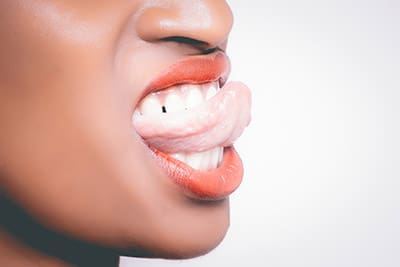The Life Cycle of Teeth

Teeth have an interesting life cycle – celebrated when they first arrive by eager parents, taken by a mystical fairy a few years later, replaced by a much larger set over a 10-15 year span, and many times ultimately lost again to be replaced by dentures. It’s a unique process that’s unlike any other part of the body.
Every person is born with 20 baby teeth hidden under their gums, 10 on the top and 10 on the bottom. These tiny little teeth typically begin to come in around 6-12 months of age for the incisors, but the process can last until around 2 years old before completion. For many children molars don’t finish coming in until 20-30 months old.
These same teeth begin to fall out a few years later. They again start with the central incisors (the front teeth on the top and bottom) this time at around 6 to 7 years old and then slowly all of the others fall out as well. In most cases children lose 4 on the top and 4 on the bottom, and then wait a few more years before beginning to lose the molars. In most cases molars fall out when the child is between 9-12 years old. As each of these teeth fall out they are replaced by a larger adult tooth, which often results in it pushing the tooth next to it aside and forcing it to fall out as well.
The final teeth to come in are the last set of molars typically known as wisdom teeth. These don’t begin to come in until between 17 and 25 years old. In some rare cases they don’t come in until many years later.
While tooth lose in older adults has gone down significantly since the 1970’s as a result of improvements in dental care, it’s still fairly common for it to occur. In some cases this is a result of general lack of health or proper oral care but in other cases it can be a result of medications that are necessary to treat other conditions or simply the formation of the teeth in general. At this point roughly 57% of Americans between the ages of 65 to 74 currently wear some form of dentures.
From start to finish your teeth have an important role to play in helping you eat food, speak clearly, and giving you the confidence of a beautiful smile. Your family dentist can help you make the best choices to properly maintain your teeth to ensure the longest, healthiest life possible.
Sensitive Teeth

One of the most common questions asked at the dentist office is “Why are my teeth so sensitive? Is there anything I can do?” Tooth sensitivity is an extremely common problem that affects over 40 million adults in the U.S. It stems from a variety of sources and can range from a mild annoyance to a major pain that affects a patient’s ability to function in normal daily activities.
Tooth sensitivity comes from the tooth enamel thinning and thus no longer being able to fully protect the tooth pulp from exposure to extreme temperatures. This results in patients having pain when they eat hot or cold foods as well as sweet or acidic foods.
What causes the enamel to thin? There can be many different causes but the most common are: tooth grinding during sleep, orthodontics/fillings, receding gums, chipped or fractured teeth, or tooth whitening. The dental team at Aesthetic Dentistry can determine what is causing your tooth sensitivity and help you address both your immediate discomfort as well as the root of the problem.
There are a few things you can do at home to help with sensitive teeth. First be careful not to brush too hard. You may find that intense, side-to-side brushing is actually removing enamel in addition to plaque. Use a soft-bristled brush in a circular or angled manner when brushing. Avoid foods that remove enamel as well. This would include acidic items such as soda, sugary carbs and sticky candy. Observe your behaviors when you’re stressed. It’s possible that grinding or clenching your teeth is a habit you aren’t even aware of. If this is the case being more aware of it may help you to stop, if not a mouth guard can be used as well. Finally, if you’ve been whitening your teeth for a while, take a break. Tooth sensitivity caused from whitening is generally temporary and will go away after a break from the bleaching.
It’s a good idea to talk with the dentist if you have persistent tooth sensitivity and allow them to determine exactly what the cause is. They can then recommend a specific toothpaste, fluoride gel, desensitizing paste or sealant to help. If necessary they can also perform any needed dental work to better protect exposed areas.
Easing Dental Fears

Dental phobia or dental anxiety are very much a real issue for many people. According to WebMD between 9-20% of Americans avoid going to the dentist because of these fears. Have you ever wondered what causes this fear or what can be done to alleviate it? There are a wide variety of sources for this fear but here are a few of the more common ones.
- Loss of personal space, embarrassment, loss of control – it’s an unusual experience to be sitting somewhere with your mouth wide open, unable to see what the person is doing in there and feeling like another person is extremely close to your personal space. It can also be embarrassing if you’re wondering if you have bad breath, or you know that your teeth are in bad shape. This is one of the most common reasons people are anxious about a dental visit. Unfortunately this often leads to canceled appointments, which only results in worse dental conditions later.
- Pain – lots of people fear pain but that anxiety increases when they begin to visualize a needle going into their mouth. Any minor fear of needles gets magnified to a new level when it involves the mouth. For most adults this fear of pain at the dentist is actually well founded and results from dental work done as a child prior to pain free dentistry becoming more common. The reality is that most dental work can be done today without any pain at all.
- Choking or gagging – many patients worry about choking on the gauze or other instruments placed in their mouth or even on their own saliva. Others have a very sensitive gag reflex and fear that the dentist will touch a certain area of their mouth and cause them to vomit. Both of these present potentially embarrassing situations for the patient, and can lead them to avoid the dentist all together. The reality is that neither of these is likely to happen and even if it did it wouldn’t be at all traumatic for the dentist and certainly not a cause for embarrassment.
So now that the fear source has been identified what can be done about it? Most importantly find a dentist you trust and talk with them about your fear. Your dentist is happy to schedule a consultation with you prior to the actual exam to allow you to ask questions and discuss concerns. For most people knowing exactly what to expect increases the patient’s feeling of control and their comfort level during the procedure. In addition, bring a supportive friend or relative along with you. This person can both encourage and distract you as needed during the visit and can often be an asset in keeping you calm during the drive to the dentist as well.
At Aesthetic Dentistry we make every effort to provide a relaxed and pain free environment for our patients. Be sure to let our receptionist or your dentist know about any concerns you have regarding your dental appointment.
Wisdom Tooth Removal

It seems like nearly everyone has had their wisdom teeth removed, but that’s only become a trend in more recent years, so what has prompted the increase in the removal of wisdom teeth? In the U.S. it’s estimated that nine million wisdom teeth are extracted annually at a cost of roughly $3 billion. In many cases it’s parents being faced with the dilemma of whether or not to have their teenager’s wisdom teeth removed and wondering if there’s any information to steer them one way or another.
For many people their wisdom teeth are removed prior to any pain or other dental issue, which may make you wonder if it was really necessary. While there may not be any pain, it does not necessarily mean that nothing is wrong. It’s possible that your dentist may want to remove your wisdom teeth as a preventative measure. This could be because in reviewing your X-Rays it’s clear that your mouth is too small for them or that they are coming in at a strange angle which will be a problem for your other teeth.
In the past, it was thought that wisdom teeth would cause crowding of all of the other teeth and they should be removed but recent research has shown that this isn’t the case. Removing the wisdom teeth has proven to neither help nor hurt the crowding situation. If, however, it’s clear that there isn’t enough room for the new teeth to come in at all, then they should still be removed.
Another common reason for their removal was the prevention of disease, infection, cysts and tooth decay. However unless a patient is highly susceptible to one of these conditions it is no longer recommended that the teeth be removed simply as a preventative measure.
If you have concerns or questions about the removal of your wisdom teeth sit down with your dentist and ask what the reasoning is for your specific situation to remove the teeth. The decision about wisdom teeth should be made on a case by case basis. While these teeth are seen as no longer necessary due to changes in human diet and advancement in technology, such as the creation of the fork and knife, that doesn’t necessarily mean they need to be removed.
Past Newsletters